- Home
- George Eliot
Felix Holt Page 7
Felix Holt Read online
Page 7
‘Sixty-seven, counting by birthdays; but your father was born old, I think,’ said Mrs Transome, a little flushed with the determination not to show any unasked-for feeling.
Her son did not notice her. All the time he had been speaking his eyes had been running down the columns of the newspaper.
‘But your little boy, Harold – where is he? How is it he has not come with you?’
‘O, I left him behind, in town,’ said Harold, still looking at the paper. ‘My man Dominic will bring him, with the rest of the luggage.2 Ah, I see it is young Debarry, and not my old friend Sir Maximus, who is offering himself as candidate for North Loamshire.’
‘Yes. You did not answer me when I wrote to you to London about your standing. There is no other Tory candidate spoken of, and you would have all the Debarry interest.’
‘I hardly think that,’ said Harold, significantly.
‘Why? Jermyn says a Tory candidate can never be got in without it.’
‘But I shall not be a Tory candidate.’
Mrs Transome felt something like an electric shock.
‘What then?’ she said, almost sharply. ‘You will not call yourself a Whig?’
‘God forbid! I’m a Radical.’
Mrs Transome’s limbs tottered; she sank into a chair. Here was a distinct confirmation of the vague but strong feeling that her son was a stranger to her. Here was a revelation to which it seemed almost as impossible to adjust her hopes and notions of a dignified life as if her son had said that he had been converted to Mahometanism at Smyrna, and had four wives, instead of one son, shortly to arrive under the care of Dominic. For the moment she had a sickening feeling that it was all of no use that the long-delayed good fortune had come at last – all of no use though the unloved Durfey was dead and buried, and though Harold had come home with plenty of money. There were rich Radicals, she was aware, as there were rich Jews and Dissenters, but she had never thought of them as county people. Sir Francis Burdett had been generally regarded as a madman.3 It was better to ask no questions, but silently to prepare herself for anything else there might be to come.
‘Will you go to your rooms, Harold, and see if there is anything you would like to have altered?’
‘Yes, let us go,’ said Harold, throwing down the newspaper, in which he had been rapidly reading almost every advertisement while his mother had been going through her sharp inward struggle. ‘Uncle Lingon is on the bench still, I see,’ he went on, as he followed her across the hall; ‘is he at home – will he be here this evening?’
‘He says you must go to the Rectory when you want to see him. You must remember you have come back to a family who have old-fashioned notions. Your uncle thought I ought to have you to myself in the first hour or two. He remembered that I had not seen my son for fifteen years.’
‘Ah, by Jove! fifteen years – so it is!’ said Harold, taking his mother’s hand and drawing it under his arm; for he had perceived that her words were charged with an intention. ‘And you are as straight as an arrow still; you will carry the shawls I have brought you as well as ever.’
They walked up the broad stone steps together in silence. Under the shock of discovering her son’s Radicalism, Mrs Transome had no impulse to say one thing rather than another; as in a man who had just been branded on the forehead all wonted motives would be uprooted. Harold, on his side, had no wish opposed to filial kindness, but his busy thoughts were imperiously determined by habits which had no reference to any woman’s feeling; and even if he could have conceived what his mother’s feeling was, his mind, after that momentary arrest, would have darted forward on its usual course.
‘I have given you the south rooms, Harold,’ said Mrs Transome, as they passed along a corridor lit from above, and lined with old family pictures. ‘I thought they would suit you best, as they all open into each other, and this middle one will make a pleasant sitting-room for you.’
‘Gad! the furniture is in a bad state,’ said Harold, glancing round at the middle room which they had just entered; ‘the moths seem to have got into the carpets and hangings.’
‘I had no choice except moths or tenants who would pay rent,’ said Mrs Transome. ‘We have been too poor to keep servants for uninhabited rooms.’
‘What! you’ve been rather pinched, eh?’
‘You find us living as we have been living these twelve years.’
‘Ah, you’ve had Durfey’s debts as well as the lawsuits – confound them! It will make a hole in sixty thousand pounds to pay off the mortgages. However, he’s gone now, poor fellow; and I suppose I should have spent more in buying an English estate some time or other. I always meant to be an Englishman, and thrash a lord or two who thrashed me at Eton.’
‘I hardly thought you could have meant that, Harold, when I found you had married a foreign wife.’
‘Would you have had me wait for a consumptive lackadaisical Englishwoman, who would have hung all her relations round my neck? I hate English wives; they want to give their opinion about everything. They interfere with a man’s life. I shall not marry again.’
Mrs Transome bit her lip, and turned away to draw up a blind. She would not reply to words which showed how completely any conception of herself and her feelings was excluded from her son’s inward world.
As she turned round again she said, ‘I suppose you have been used to great luxury; these rooms look miserable to you, but you can soon make any alteration you like.’
‘O, I must have a private sitting-room fitted up for myself down-stairs. And the rest are bedrooms, I suppose,’ he went on, opening a side-door. ‘Ah, I can sleep here a night or two. But there’s a bedroom down-stairs, with an anteroom, I remember, that would do for my man Dominic and the little boy. I should like to have that.’
‘Your father has slept there for years. He will be like a distracted insect, and never know where to go, if you alter the track he has to walk in.’
‘That’s a pity. I hate going up-stairs.’
‘There is the steward’s room: it is not used, and might be turned into a bedroom. I can’t offer you my room, for I sleep up-stairs.’ (Mrs Transome’s tongue could be a whip upon occasion, but the lash had not fallen on a sensitive spot.)
‘No; I’m determined not to sleep up-stairs. We’ll see about the steward’s room to-morrow, and I daresay I shall find a closet of some sort for Dominic. It’s a nuisance he had to stay behind, for I shall have nobody to cook for me. Ah, there’s the old river I used to fish in. I often thought, when I was at Smyrna, that I would buy a park with a river through it as much like the Lapp as possible. Gad, what fine oaks those are opposite! Some of them must come down, though.’
‘I’ve held every tree sacred on the demesne, as I told you, Harold. I trusted to your getting the estate some time, and releasing it; and I determined to keep it worth releasing. A park without fine timber is no better than a beauty without teeth and hair.’
‘Bravo, mother!’ said Harold, putting his hand on her shoulder. ‘Ah, you’ve had to worry yourself about things that don’t properly belong to a woman – my father being weakly. We’ll set all that right. You shall have nothing to do now but to be grandmamma on satin cushions.’
‘You must excuse me from the satin cushions. That is a part of the old woman’s duty I am not prepared for. I am used to be chief bailiff, and to sit in the saddle two or three hours every day. There are two farms on our hands besides the Home Farm.’
‘Phew-ew! Jermyn manages the estate badly, then. That will not last under my reign,’ said Harold, turning on his heel and feeling in his pockets for the keys of his portmanteaus, which had been brought up.
‘Perhaps when you’ve been in England a little longer,’ said Mrs Transome, colouring as if she had been a girl, ‘you will understand better the difficulty there is in letting farms in these times.’
‘I understand the difficulty perfectly, mother. To let farms, a man must have the sense to see what will make them inviting to farmers, and to get se
nse supplied on demand is just the most difficult transaction I know of. I suppose if I ring there’s some fellow who can act as valet and learn to attend to my hookah?’
‘There is Hickes the butler, and there is Jabez the footman; those are all the men in the house. They were here when you left.’
‘O, I remember Jabez – he was a dolt. I’ll have old Hickes. He was a neat little machine of a butler; his words used to come like the clicks of an engine. He must be an old machine now, though.’
‘You seem to remember some things about home wonderfully well, Harold.’
‘Never forget places and people – how they look and what can be done with them. All the country round here lies like a map in my brain. A deuced pretty country too; but the people were a stupid set of old Whigs and Tories. I suppose they are much as they were.’
‘I am, at least, Harold. You are the first of your family that ever talked of being a Radical. I did not think I was taking care of our old oaks for that. I always thought Radicals’ houses stood staring above poor sticks of young trees and iron hurdles.’
‘Yes, but the Radical sticks are growing, mother, and half the Tory oaks are rotting,’ said Harold, with gay carelessness. ‘You’ve arranged for Jermyn to be early to-morrow?’
‘He will be here to breakfast at nine. But I leave you to Hickes now; we dine in an hour.’
Mrs Transome went away and shut herself in her own dressing-room. It had come to pass now – this meeting with the son who had been the object of so much longing; whom she had longed for before he was born, for whom she had sinned, from whom she had wrenched herself with pain at their parting, and whose coming again had been the one great hope of her years. The moment was gone by; there had been no ecstasy, no gladness even; hardly half an hour had passed, and few words had been spoken, yet with that quickness in weaving new futures which belongs to women whose actions have kept them in habitual fear of consequences, Mrs Transome thought she saw with all the clearness of demonstration that her son’s return had not been a good for her in the sense of making her any happier.
She stood before a tall mirror, going close to it and looking at her face with hard scrutiny, as if it were unrelated to herself. No elderly face can be handsome, looked at in that way; every little detail is startlingly prominent, and the effect of the whole is lost. She saw the dried-up complexion, and the deep lines of bitter discontent about the mouth.
‘I am a hag!’ she said to herself (she was accustomed to give her thoughts a very sharp outline), ‘an ugly old woman who happens to be his mother. That is what he sees in me, as I see a stranger in him. I shall count for nothing. I was foolish to expect anything else.’
She turned away from the mirror and walked up and down her room.
‘What a likeness!’ she said, in a loud whisper; ‘yet, perhaps, no one will see it besides me.’
She threw herself into a chair, and sat with a fixed look, seeing nothing that was actually present, but inwardly seeing with painful vividness what had been present with her a little more than thirty years ago – the little round-limbed creature that had been leaning against her knees, and stamping tiny feet, and looking up at her with gurgling laughter. She had thought that the possession of this child would give unity to her life, and make some gladness through the changing years that would grow as fruit out of these early maternal caresses. But nothing had come just as she had wished. The mother’s early raptures had lasted but a short time, and even while they lasted there had grown up in the midst of them a hungry desire, like a black poisonous plant feeding in the sunlight, – the desire that her first, rickety, ugly, imbecile child should die, and leave room for her darling, of whom she could be proud. Such desires make life a hideous lottery, where every day may turn up a blank; where men and women who have the softest beds and the most delicate eating, who have a very large share of that sky and earth which some are born to have no more of than the fraction to be got in a crowded entry, yet grow haggard, fevered, and restless, like those who watch in other lotteries. Day after day, year after year, had yielded blanks; new cares had come, bringing other desires for results quite beyond her grasp, which must also be watched for in the lottery; and all the while the round-limbed pet had been growing into a strong youth, who liked many things better than his mother’s caresses, and who had a much keener consciousness of his independent existence than of his relation to her: the lizard’s egg, that white rounded passive prettiness, had become a brown, darting, determined lizard. The mother’s love is at first an absorbing delight, blunting all other sensibilities; it is an expansion of the animal existence; it enlarges the imagined range for self to move in: but in after years it can only continue to be joy on the same terms as other long-lived love – that is, by much suppression of self, and power of living in the experience of another. Mrs Transome had darkly felt the pressure of that unchangeable fact. Yet she had clung to the belief that somehow the possession of this son was the best thing she lived for; to believe otherwise would have made her memory too ghastly a companion. Some time or other, by some means, the estate she was struggling to save from the grasp of the law would be Harold’s. Somehow the hated Durfey, the imbecile eldest, who seemed to have become tenacious of a despicable squandering life, would be got rid of; vice might kill him. Meanwhile the estate was burthened: there was no good prospect for any heir. Harold must go and make a career for himself: and this was what he was bent on, with a precocious clearness of perception as to the conditions on which he could hope for any advantages in life. Like most energetic natures, he had a strong faith in his luck; he had been gay at their parting, and had promised to make his fortune; and in spite of past disappointments, Harold’s possible fortune still made some ground for his mother to plant her hopes in. His luck had not failed him; yet nothing had turned out according to her expectations. Her life had been like a spoiled shabby pleasure-day, in which the music and the processions are all missed, and nothing is left at evening but the weariness of striving after what has been failed of. Harold had gone with the Embassy to Constantinople, under the patronage of a high relative, his mother’s cousin; he was to be a diplomatist, and work his way upward in public life. But his luck had taken another shape: he had saved the life of an Armenian banker, who in gratitude had offered him a prospect which his practical mind had preferred to the problematic promises of diplomacy and high-born cousinship. Harold had become a merchant and banker at Smyrna; had let the years pass without caring to find the possibility of visiting his early home, and had shown no eagerness to make his life at all familiar to his mother, asking for letters about England, but writing scantily about himself. Mrs Transome had kept up the habit of writing to her son, but gradually the unfruitful years had dulled her hopes and yearnings; increasing anxieties about money had worried her, and she was more sure of being fretted by bad news about her dissolute eldest son than of hearing anything to cheer her from Harold. She had begun to live merely in small immediate cares and occupations, and, like all eager-minded women who advance in life without any activity of tenderness or any large sympathy, she had contracted small rigid habits of thinking and acting, she had her ‘ways’ which must not be crossed, and had learned to fill up the great void of life with giving small orders to tenants, insisting on medicines for infirm cottagers, winning small triumphs in bargains and personal economies, and parrying ill-natured remarks of Lady Debarry’s by lancet-edged epigrams. So her life had gone on till more than a year ago, when that desire which had been so hungry while she was a blooming young mother, was at last fulfilled – at last, when her hair was grey, and her face looked bitter, restless, and unenjoying, like her life. The news came from Jersey that Durfey, the imbecile son, was dead. Now Harold was heir to the estate; now the wealth he had gained could release the land from its burthens; now he would think it worth while to return home. A change had at last come over her life, and the sunlight breaking the clouds at evening was pleasant, though the sun must sink before long. Hopes, affections, the sweet
er part of her memories, started from their wintry sleep, and it once more seemed a great good to have had a second son who in some ways had cost her dearly. But again there were conditions she had not reckoned on. When the good tidings had been sent to Harold, and he had announced that he would return so soon as he could wind up his affairs, he had for the first time informed his mother that he had been married, that his Greek wife was no longer living, but that he should bring home a little boy, the finest and most desirable of heirs and grandsons. Harold, seated in his distant Smyrna home, considered that he was taking a rational view of what things must have become by this time at the old place in England, when he figured his mother as a good elderly lady, who would necessarily be delighted with the possession on any terms of a healthy grandchild, and would not mind much about the particulars of the long-concealed marriage.
Mrs Transome had torn up that letter in a rage. But in the months which had elapsed before Harold could actually arrive, she had prepared herself as well as she could to suppress all reproaches or queries which her son might resent, and to acquiesce in his evident wishes. The return was still looked for with longing; affection and satisfied pride would again warm her later years. She was ignorant what sort of man Harold had become now, and of course he must be changed in many ways; but though she told herself this, still the image that she knew, the image fondness clung to, necessarily prevailed over the negatives insisted on by her reason.
And so it was, that when she had moved to the door to meet him, she had been sure that she should clasp her son again, and feel that he was the same who had been her boy, her little one, the loved child of her passionate youth. An hour seemed to have changed everything for her. A woman’s hopes are woven of sunbeams; a shadow annihilates them. The shadow which had fallen over Mrs Transome in this first interview with her son was the presentiment of her powerlessness. If things went wrong, if Harold got unpleasantly disposed in a certain direction where her chief dread had always lain, she seemed to foresee that her words would be of no avail. The keenness of her anxiety in this matter had served as insight; and Harold’s rapidity, decision, and indifference to any impressions in others which did not further or impede his own purposes, had made themselves felt by her as much as she would have felt the unmanageable strength of a great bird which had alighted near her, and allowed her to stroke its wing for a moment because food lay near her.

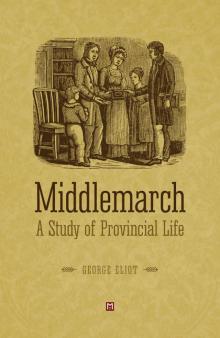 Middlemarch
Middlemarch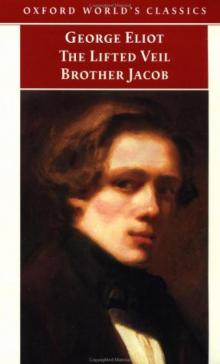 Brother Jacob
Brother Jacob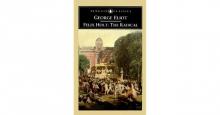 Felix Holt, the Radical
Felix Holt, the Radical Mr Gilfil's Love Story
Mr Gilfil's Love Story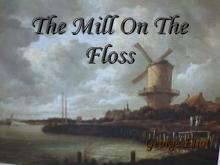 The Mill on the Floss
The Mill on the Floss Silas Marner
Silas Marner Adam Bede
Adam Bede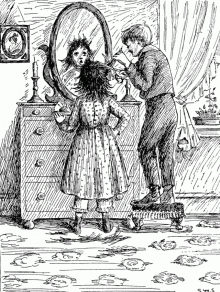 Tom and Maggie Tulliver
Tom and Maggie Tulliver The Damn Fool
The Damn Fool The Lifted Veil
The Lifted Veil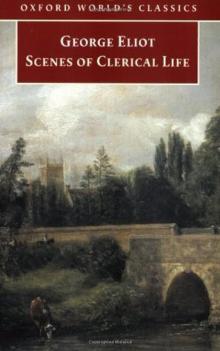 Scenes of Clerical Life
Scenes of Clerical Life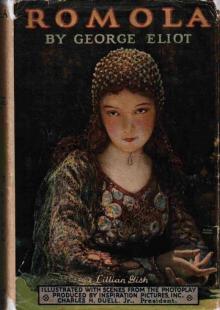 Romola
Romola Daniel Deronda
Daniel Deronda Felix Holt
Felix Holt